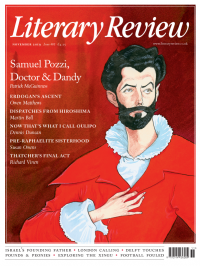Michael Alexander
A Play by Any Other Name
Anyone interested in books knows of the First Folio, the collection officially titled Mr William Shakespeare’s Comedies, Histories, & Tragedies, which was published in London in 1623. But they may not have seen a copy. More often seen is the image of the author on the Folio’s title page. Some people will also have looked at the ‘Catalogue of all the Severall Comedies, Histories and Tragedies’, as the contents page is headed, and read Ben Jonson’s tribute ‘To the Memory of My Beloved, the AUTHOR Master William Shakespeare and what he hath left us’. What he left us, Jonson claims, made his friend and rival the greatest of European dramatists.
Few individuals, however, will have read through the unmodernised text of this volume, with its thirty-six plays and nine hundred desk-requiring, double-column pages. The Folio is a great present to posterity, yet it is now a part of bibliographical history: an antique volume usually found in a specialist library. Most of us could not define exactly what a folio is. I have glimpsed a quarto in a museum, but have never seen any of the ‘foul papers’ that editors invoke. Readers generally skip the editorial niceties and get to the text – a modernised text, furnished with act, scene and line numbers, and with pictures of performances we have never seen, the verse distinguished from the prose and difficult words glossed. Variant text lies at the bottom of the page for a second reading – if there is one.
Yet the Folio’s fame is deserved. Had there never been an Authorised Version of the Bible, that other big book of James I’s reign, there were nonetheless plenty of other Bibles. But without the Folio, we would not have The Tempest, Twelfth Night, Macbeth, Antony and Cleopatra and fourteen

Sign Up to our newsletter
Receive free articles, highlights from the archive, news, details of prizes, and much more.@Lit_Review
Follow Literary Review on Twitter
Twitter Feed
It wasn’t until 1825 that Pepys’s diary became available for the first time. How it was eventually decrypted and published is a story of subterfuge and duplicity.
Kate Loveman tells the tale.
Kate Loveman - Publishing Pepys
Kate Loveman: Publishing Pepys
literaryreview.co.uk
Arthur Christopher Benson was a pillar of the Edwardian establishment. He was supremely well connected. As his newly published diaries reveal, he was also riotously indiscreet.
Piers Brendon compares Benson’s journals to others from the 20th century.
Piers Brendon - Land of Dopes & Tories
Piers Brendon: Land of Dopes & Tories - The Benson Diaries: Selections from the Diary of Arthur Christopher Benson by Eamon Duffy & Ronald Hyam (edd)
literaryreview.co.uk
Of the siblings Gwen and Augustus John, it is Augustus who has commanded most attention from collectors and connoisseurs.
Was he really the finer artist, asks Tanya Harrod, or is it time Gwen emerged from her brother’s shadow?
Tanya Harrod - Cut from the Same Canvas
Tanya Harrod: Cut from the Same Canvas - Artists, Siblings, Visionaries: The Lives and Loves of Gwen and Augustus John by Judith Mackrell
literaryreview.co.uk